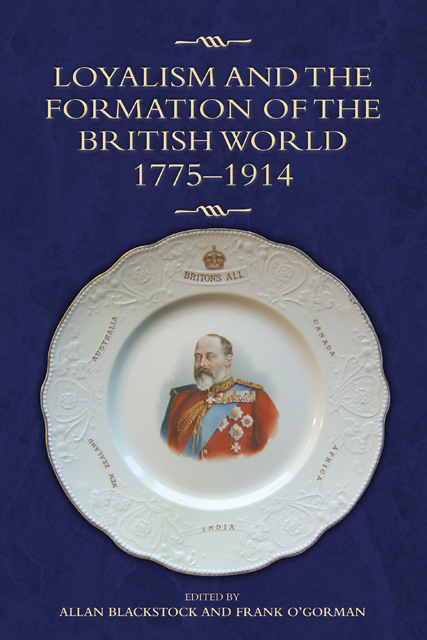Book contents
- Frontmatter
- Contents
- Notes on Contributors
- 1 Loyalism and the British World: Overviews, Themes and Linkages
- 2 Origins and Trajectories of Loyalism in England, 1580–1840
- 3 The ‘Spirit of Loyalty’: Material Culture, Space and the Construction of an English Loyalist Memory, 1790–1840
- 4 Anti-Catholicism and Orange Loyalism in Nineteenth-Century Britain
- 5 Loyalty and the Monarchy in Ireland, c.1660–c.1840
- 6 The Trajectories of Loyalty and Loyalism in Ireland, 1793–1849
- 7 Presbyterians, Loyalty and Orangeism in Nineteenth-Century Ulster
- 8 Unionists and Patriots: James Whiteside, the Irish Bar and the Dilemmas of the Protestant Nation in Victorian Ireland
- 9 Loyalism in British North America in the Age of Revolution, c.1775–1812
- 10 ‘A Colonial Hybrid’: Nineteenth-Century Loyalism as Articulated by the Orange Order in the Maritime Colonies of British North America
- 11 Canadian Catholics, Loyalty, and the British Empire, 1763–1901
- 12 Loyalism in Australasia, 1788–1868
- 13 ‘We love one country, one queen, one flag’: Loyalism in Early Colonial New Zealand, 1840–80
- 14 Clientelism, Community and Collaboration: Loyalism in Nineteenth-Century Colonial India
- Select bibliography
- Index
6 - The Trajectories of Loyalty and Loyalism in Ireland, 1793–1849
Published online by Cambridge University Press: 28 February 2023
- Frontmatter
- Contents
- Notes on Contributors
- 1 Loyalism and the British World: Overviews, Themes and Linkages
- 2 Origins and Trajectories of Loyalism in England, 1580–1840
- 3 The ‘Spirit of Loyalty’: Material Culture, Space and the Construction of an English Loyalist Memory, 1790–1840
- 4 Anti-Catholicism and Orange Loyalism in Nineteenth-Century Britain
- 5 Loyalty and the Monarchy in Ireland, c.1660–c.1840
- 6 The Trajectories of Loyalty and Loyalism in Ireland, 1793–1849
- 7 Presbyterians, Loyalty and Orangeism in Nineteenth-Century Ulster
- 8 Unionists and Patriots: James Whiteside, the Irish Bar and the Dilemmas of the Protestant Nation in Victorian Ireland
- 9 Loyalism in British North America in the Age of Revolution, c.1775–1812
- 10 ‘A Colonial Hybrid’: Nineteenth-Century Loyalism as Articulated by the Orange Order in the Maritime Colonies of British North America
- 11 Canadian Catholics, Loyalty, and the British Empire, 1763–1901
- 12 Loyalism in Australasia, 1788–1868
- 13 ‘We love one country, one queen, one flag’: Loyalism in Early Colonial New Zealand, 1840–80
- 14 Clientelism, Community and Collaboration: Loyalism in Nineteenth-Century Colonial India
- Select bibliography
- Index
Summary
It is a truism to say that Irish loyalism has received less historical scrutiny than Irish nationalism. Unlike nationalism, which has been anatomised to reveal its multifarious strands, loyalism is assumed to be uniformly reactionary and homogenous. Yet, as this volume demonstrates, loyalism, when viewed contemporaneously, embraced a diverse range of standpoints. Loyalism, moreover, was not confined to the British and Irish islands but occurred throughout the British Atlantic world, for example, in North America, where its width of appeal is now recognised. Recent research notes loyalism’s overall dynamism and diversity and examines it in its own right rather than presenting it as a dull, monolithic and unchanging opposition to nationalism or radicalism. For example, loyalism in Britain can be fitted into a traditional pattern of responses to threats stretching back at least to the seventeenth century; yet the counter-revolutionary loyalism of the 1790s was no reactionary reflex, but a broadly-based phenomenon empowering its plebeian adherents whose participation was negotiated not assumed. This chapter explores the trajectories of Irish loyalty from 1793, when war with France saw Ireland experience the same counter-revolutionary impulse as Britain, to 1849, the year of Queen Victoria’s visit. For some like Daniel O’Connell, Victoria represented an outward-looking, accommodative, patriotic loyalty. However, there was a world of difference between this ‘public loyalty’ and a narrower variant of loyalism which precipitated a clash at Dolly’s Brae, also in 1849, which resulted in around thirty Catholic deaths, almost triple the fatalities at Peterloo. These crude polarities conceal an even greater variety of loyalty in Ireland.
A critical distinction must be made between loyalty and the organised phenomena or movement known as loyalism. In 1793 three distinctive variants of Irish loyal opinion are distinguishable. First, there was an Anglican, neo-conservative strand which venerated the ‘Happy Constitution’, envisaged as a structure of governance established in 1688 and perfected by ‘Protestant Ascendancy’. Second, a liberal, enlightened version of loyalty evinced by moderate Presbyterians and some Anglicans. They saw loyalty as compatible with constitutional adjustments, like parliamentary reform and Catholic emancipation. For example, a Volunteer corps from Magherafelt, County Londonderry, pledged loyalty to the king yet demanded reform and emancipation. The third strand was a Catholic loyalty eager to demonstrate entitlement to emancipation by supporting the existing system and opposing the French.
- Type
- Chapter
- Information
- Loyalism and the Formation of the British World, 1775-1914 , pp. 103 - 124Publisher: Boydell & BrewerPrint publication year: 2014



